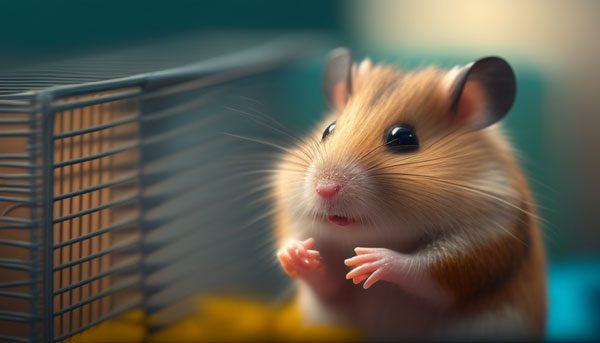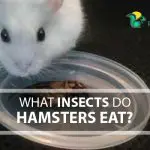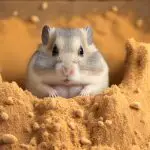Why Is My Hamster Poop Green? Everything You Need To Know
Getting a pet is indeed very exciting. And the feces of your pet tells a lot about their health. So when you see your pet hamster having green poop, you need to find out the reason and take action accordingly.
Now you ask, why is my hamster poop green? Well, there could be multiple reasons, such as
- Diarrhea
- Poor hygiene
- Change in weather
- Lack of nutritious food
- Stress, or food poisoning
But what are the symptoms of any of these illnesses and how to cure and prevent them? Well, do not worry we shall discuss all of your concerns right down below.
Why Is My Hamster Poop Green?
A general rule of thumb is changes in the color of your pet’s feces are never a good sign unless there was a diet change. Your hamster’s poop suddenly turning green could mean there was a change in diet to leafy greeny vegetables.

Or it could mean something serious as your hamster having food poisoning. But the symptoms of any of the illnesses are pretty distinct and straightforward. A bit of care and attention is sufficient in most cases to normalize your hamster’s condition.
Is My Hamster’s Poop Green Due To Diarrhea?
Yes, diarrhea is one of the main reasons for green feces in hamsters. Diarrhea in hamsters is nothing new. Since hamsters are chewy active little mammals, they can easily overeat.
Overeating green vegetables and fresh fruits is one of the main causes. But dehydration and bacteria in your hamster’s abdomen could cause diarrhea too.

Any signs of diarrhea hence should be taken into immediate consideration. As diarrhea is much more of a life-threatening issue to our hamsters than we can fathom.
Symptoms
The symptoms of diarrhea are watery, greenish poop along with a lack of energy displayed by your hamster. Symptoms also include a wet tail or blood in feces.
To-Do
In case of diarrhea, we would recommend immediately contacting a vet and getting an appointment. Even more so if your hamster is a youngling and shows symptoms of a wet tail.
Prevention
- Encourage your hamster to properly hydrate itself and also circulate your hamster’s daily diet switching between different food options.
- Have your hamster in regular checkups with a vet.
- Allow your hamster to play and expend its energy daily. As exercise helps in food digestion.
Your Hamster Has Dietary Issues
Green poop is not always a problem as stated earlier. Intake of regular greeny vegetables could make your little buddy’s feces green. Just make sure the feces are not runny or watery as it is a sign of diarrhea.
Accordingly, if the meals are not varied and circulated, it could let to diarrhea. So it is best to give your hamster greeny vegetables every 4 out of 7 days a week.

Even after a change of diet, if your hamster has green stools, it might be a sign of malnutrition in his diet. Malnutrition could have severe health effects such as pain in the abdomen.
Here is a simple table as a dietary guide to your hamster:
| Food Type | Food |
|---|---|
| Vegetable | Carrot, cauliflower, cabbage, broccoli |
| Fruits | Pear, Melon, Apple, Peach |
| Herbs | Basil, Coriander, Sage, Parsley |
If you notice your hamster dragging his tail between his legs, it is a sign of pain in the abdomen. Pain in the abdomen can have many other causes other than malnutrition. So it is best to consult a doctor if the symptom shows.
Symptoms
Green stools even after no vegetable intake.
To-Do
If you realize that your hamster is suffering from malnutrition, it is best to change his diet. Do your research or consult a vet for convenience to meet your hamster’s daily nutrition requirements. Here’s a video that will help you with the diet;
Prevention
A thought-out diet plan for your hamster, and make sure to follow it thoroughly.
Changes In Weather Could Be A Cause
Hamsters tend to have green feces during winter when they are feeling cold. Also, they can have problems hibernating which can induce stress as we will discuss in our next topic.

Symptoms
Your hamster sleeps curling up in winter.
To-Do
Try to keep your hamster warm simply by including a blanket where he sleeps. Or covering his cage appropriately so he stays warm. So if your hamster wants to undergo hibernation, there are no problems.
Prevention
Try your best to keep your hamster warm.
Your Hamster Is Stressed
Stress in hamsters not only has negative effects on their mental health but their physical health too. Much like us, they also have irregular bowel movements when stressed out. Hence producing green feces when they are stressed.
So it is important to keep in mind what breed of hamster we are petting. Some breeds of hamsters prefer to live alone, while other breeds prefer to have company.

If your breed of hamster doesn’t like company but you keep multiple hamsters in one cage, that could cause them stress. Also, if your breed of hamster prefers company but you are letting them live alone in their cage, that could also induce stress in them.
Also, it is important to keep your hamster cage somewhere isolated. So that if you have guests in your house, they are not in constant exposure to strangers. As hamster prefers to live with familiar faces.
Symptoms
Loss of appetite, staying in the corner of the cage for an extended period, does not want human interactions, aggression during petting.
To-Do
Move the cage to an isolated area. Also, try to keep them alone or in pairs depending on their breeds
Prevention
Notice any changes in their environment that make them defensive or aggressive and hence try to revert the changes.
Your Hamster Has Skin Infections
Skin infections in hamsters are nothing new. Not only do such issues trigger loss of fur and appetite, but it also causes green feces. Skin infections can be caused by ringworm or allergic dermatitis and need asap medical attention.

Symptoms
Rashes, redness, or loss of fur.
To-Do
Contact the vet and appoint a visit ASAP.
Prevention
Keep your hamster away from allergic foods. Different hamsters are allergic to different sorts of foods, so it is best to counsel a doctor.
If you’re a hamster owner, you may have concerns about your pet’s health or behavior. Two topics you might be interested in learning more about are hamsters with big balls and the best way to give your hamster water. Our article on hamsters with big balls explains why some male hamsters may have enlarged testicles and what you can do about it. Meanwhile, if you’re considering switching from a water bottle to a bowl, our article on can hamsters drink out of bowls? provides helpful tips on how to safely give your hamster water. Check out our articles for more information on how to take care of your furry friend.FAQs
Below we shall discuss the most frequently asked questions about hamsters.
Q: Can Pneumonia Cause Green Stools?
Yes. Pneumonia sometimes is responsible for green poop in hamsters. Hence, it is important to keep your hamster and its cage warm to prevent any deadly outcome.
Q: Could antibiotics cause green feces?
Yes! The vet will inform you beforehand if any prescribed antibiotic has such effects. But antibiotics certainly can cause green feces.
Q: Can a dirty cage cause green stools in hamsters?
Yes, hamsters are genuinely concerned about their hygiene and grooming. Dirty cages could very well induce stress in them. And stress is one of the main factors in green feces in hamsters.
Conclusion
We have extensively talked about the topic of why is my hamster poop green? Well, there could be various reasons. From health issues such as diarrhea and abdominal bacteria to stress, even the daily diet of your hamster could cause green feces.
Therefore, it is essential to be vigilant about the causes your pet has been through, such as the surroundings, food and health. If you are confused about what to do in case of this scenario, immediately call a vet.




